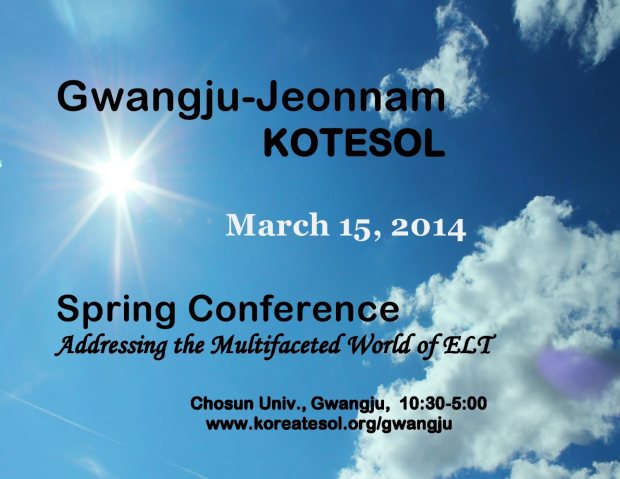
Gwangju-Jeonnam Chapter Meeting - February
Time: Saturday, February 15, 2014
Place: Chosun University (Gwangju), Main Building (본관), Room 4211.
Program
1:45 Sign-in and Meet-and-Greet
(Admission is free. Future membership is welcomed.)
2:00 PRESENTATION 1
>> Stand Up and Read: Adding Movement and Excitement to Reading Activities
Henry Gerlits (Jeollanam-do Educational Training Institute)
2:45 Refreshment Break
3:00 PRESENTATION 2
>> Fun and Games: Activities for Young Learners
Jacob Boers (Gwangju EPIK Elementary School Program)
4:00 Swap-Shop Session
Everyone is invited to Share one of your Teaching Ideas, Classroom Activities, and ELT Games, Books, etc.
4:30 Announcements / Drawing for Door Prizes / Closing
_______________________________________________________________________________
Presenter Abstracts and Biographical Sketches
1. Stand Up and Read: Adding Movement and Excitement to Reading Activities
By Henry Gerlits
Reading? In an elementary English classroom? With all the energy that students have, sometimes it’s difficult to ask them to sit down and do reading activities. So – why not have them stand up and read instead? This workshop will explore different ways to add movement and excitement to reading activities, while preserving their educational value.
We’ll begin with warm-ups – some traditional “pre-reading” activities including a preview of vocabulary, and others adapted from theater ice-breakers. From there we’ll move toward engaging “during-reading” variations that will keep your students hopping in their seats – or maybe even jumping out of them! By injecting gestures and emotions into reading, we’ll keep the students focused on the English meaning of the readings, and hopefully help them to build memorable connections to the text. We’ll end up with some effective ways to improve comprehension and vocabulary retention while also keeping the class engaging for your students.
In addition, this workshop will explore the concept of Reader’s Theater – reading activities with a focus on the emotion and intonation of play dialogue. Utilizing the pressure and thrill of performance in the classroom, your English learners have the opportunity to forget that they’re “learning English” and can focus on the plot and comedy of an acted-out story. With props and maybe even some marks and blocking, students will discover a new dimension of reading and storytelling. And of course, theater is perfect for getting everyone out of their seats and moving!
From warm-ups to dynamic readings to active review, these activities will help your students grow into readers. I’m hoping that you’ll join me in this very active workshop. Watch out, you might have to stand up as well!
The Presenter
Henry Gerlits worked at Gwangju University for two years before moving to the Jeolla-namdo Educational Training Institute (JETI) in Damyang, where he is completing his first year of training public school English teachers. He has been teaching English since 2005, and has experience in Korea, Japan, and in his hometown of Boston (USA). His interests include hiking, cooking, yoga, strategy gaming, and traveling. He can be reached at henry.gerlits@gmail.com.
_________________
2. Fun and Games: Activities for Young Learners
By Jacob Boer
The national elementary public school English curriculum puts a tremendous emphasis on playing short games with almost every teaching hour in the classroom. For young learners, language learning games are a low-stress alternative to time spent on rote memorization and standardized testing. This is the correct approach because having fun and using your imagination comes natural to children and is essential for the development of automaticity in language skills.
Too often though, the coursebook provides insufficient materials or completely lacks engaging and fun materials for the teacher to use class to class. This means that the teacher has to reach beyond the familiarity of their teacher's manual and find or create supplemental materials for their classroom activities. In this talk, we will think about what children enjoy doing while learning and how a teacher's objectives can also be met while playing EFL games with young learners.
The Presenter
Jacob Boer has lived and worked in South Korea for five years. Like many who came before him, he thought he would only stay a short time. But, he has found Korea to be a very exciting land with many great opportunities and adventures. Jacob currently teaches at Samgak Elementary with the English Program in Korea (EPIK) and does teacher training and conversation sessions for the Gwangju Metropolitan Office of Education. He also lectures at native teacher training workshops and at orientations for new EPIK teachers on lesson planning for the elementary school curriculum and PowerPoint use in the EFL classroom.



